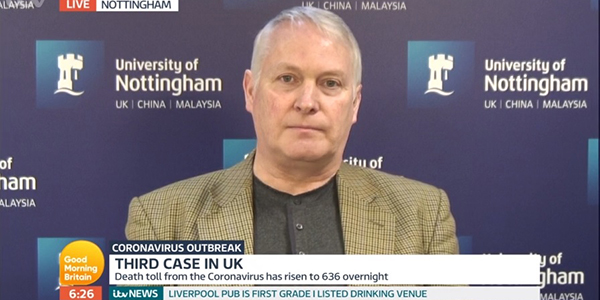
August 17, 2020, by Emma Thorne
Bumper crop of media coverage from top stories and COVID-19 expertise
The chances of switching on the TV or opening a newspaper and seeing a story featuring the University of Nottingham were massively increased this year. Academic expertise from the University has placed it at the forefront of news commentary around the globe during the coronavirus pandemic, leading to an unprecedented rise in media coverage.
From January to August 2020, the Media Relations Team in External Relations has tracked an increase in broadcast audiences to 1.35 billion and more than doubled print and online audiences to 104 billion and advertising value equivalent (AVE) of coverage to £964 million on the same period last year.
With professional support from the Press Office team, academics including virologist Professor Jonathan Ball in the School of Life Sciences, whose work with the media was recently recognised with a Vice-Chancellor’s Medal, and Keith Neal, Emeritus Professor in the Epidemiology of Infectious Diseases, are among national print and broadcast journalists’ go-to experts on a daily basis for a range of COVID-19-related topics including vaccine development, antibody testing and public health protection measures.
They have been joined in the media spotlight by a numerous other University experts featured in national COVID-19 news stories including Dr Rachel Tarlinton from Veterinary Medicine and Sciences (Sky News); Dr Chris Coleman, Assistant Professor of Infection Immunology (Daily Telegraph); virologist Professor Will Irving (The Guardian); and John Gathergood, Professor of Economics (Daily Telegraph), among many more.
Nottingham’s COVID-19 contributions in the spotlight
The University’s fight against the coronavirus has also made headlines. In July, Channel 4 News featured a study examining why some people with coronavirus are more susceptible to serious illness led by Ben Ollivere, Professor of Orthopaedic Trauma and Ana Valdes, Associate Professor in the School of Medicine, while back in June, Sky News visited the lab of Lindy Durrant, Professor of Cancer Immunotherapy, who is testing a vaccine, which encourages a patient’s immune system to fight the disease.
Microbiologist Dr David Turner, who is researching how many children in our region have had the COVID-19 infection and Dr Samantha Bryan in the Faculty of Engineering, who is working with the biotech company Cyanetics and Public Health England to use a harmless bacteria found in soil to develop a COVID-19 vaccine, have both been featured by local news outlet BBC East Midlands Today.
In April, the BBC’s One Show paid emotional tribute to the contribution of the University’s medical students who graduated early to fight the virus on the NHS frontline by hosting a virtual graduation leading to a flurry of tweets from viewers who had been moved to tears, including TV presenter Richard Osman who told followers the segment had left him ‘weeping’.
But the Press Office team has also played a key role in helping to promote research offering a welcome respite from the relentless rolling coverage of coronavirus.
In the biggest single news story of the year, research by Dr Cris Conselice in the School of Physics and Astronomy, which hypothesised that there could be as many as 36 alien species in our galaxy, was featured by more than 1,000 different news outlets with AVE of more than £30m including CNN, The Guardian, the Daily Star (front page) and Newsround, and captured the imagination of comedian David Mitchell who penned his Guardian column around the revelation.
Making the headlines
Other top stories have included:
- Professor John Robertson in the School of Medicine who spoke to ITN News about a blood test he spent 25 years of his career developing which is now providing a breakthrough in lung cancer detection rates.
- The return to campus of our April cohort of Vet Students which was featured on national BBC News and including this lovely piece, BBC Radio 4 The World Tonight, BBC Radio 4 You and Yours and Times Radio, among others. The publicity led to a spike in people visiting the Clearing pages and registering interest on the day BBC News featured the story.
- A survey of 500 A-level students in England, involving Dr Martin Myers in the School of Education, which suggested almost twice as many students would have preferred to have taken their exams, rather than rely on estimated grades which was featured by news outlets including BBC News and BBC East Midlands Today
- Professor David Walsh, Director of the Pain Centre Versus Arthritis and Assistant Professor in Sport and Exercise Medicine, Joanne Stocks, were featured on the Channel 4 show How to Beat… Pain looking at which simple techniques can help to relieve chronic pain.
- New research led by Professor Stephen Jackson in the School of Psychology which found that delivering electrical pulses to the wrist can significantly reduce the amount and severity of tics experienced by individuals with Tourette Syndrome (TS) was picked up by the Daily Mail, the Metro, The Times and New Scientist, among others as well as featuring on BBC East Midlands Today.
And finally, 2020 was the year that saw a rekindling of the tragic love story behind everybody’s favourite shellebrity snail Jeremy and his School of Life Sciences scientist Dr Angus Davison. Jeremy first rose to global mega stardom in October 2016 after a public appeal on BBC Radio 4’s Today programme seeking a similarly rare mutant love for the lefty mollusc. Research published in June, showing that the rare left-spiralling shell of Jeremy and garden snails of his kind is usually a development accident rather than an inherited condition, sparked a resurgence in media interest in the story of the unfortunate gastropod whose genitals were in the wrong place for mating. The story featured again on BBC Radio 4 Today, the Daily Mail, The i News, The Times and the Guardian – and led to an Experience feature for Dr Davison in the Guardian recently.
No comments yet, fill out a comment to be the first

Leave a Reply